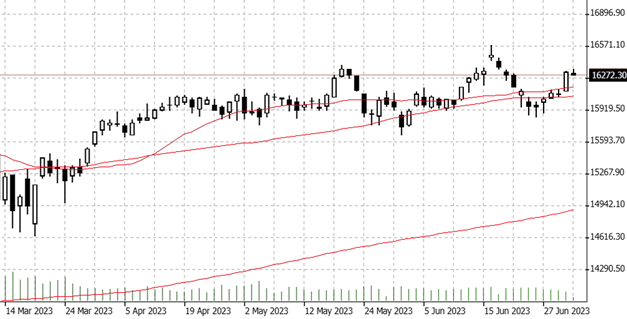

03.07.2023 – Today, Monday, marks the 35th birthday of the German Share Index. Quite a success story. We take a brief look back – and also look at how it might continue.
The index naturally reflects the changes in Germany as an industrial location. Who still knows Bayerische Hypotheken- und Wechselbank, Bayerische Vereinsbank, Degussa, Deutsche Babcock, Feldmühle Nobel, Karstadt or Kaufhof? It was only in September 2021 that the number of companies included in the index was increased from 30 to 40. The DAX ended the first half of 2023 bullish: The return was a nice 15 percent. Around two weeks ago, the index also marked a new all-time high of 16,427 points. Here is the daily chart.

Source: Bernstein Bank GmbH
The derivatives department at DZ Bank sees support at 15,975 points and has this opinion: “After the DAX fell 719 points, or the equivalent of about 4.4%, from the local maximum of June 16 in a first wave of selling to the local minimum of June 26, a recovery movement set in last week. This enabled the index to trigger a buy signal in the slow stochastic as well as to recapture the moving averages of the last 50 and 20 trading days. On top of that, the GD 200 buy signal has held since November 08, 2022.” We add: The 20 line is at the top of our picture, the 200 line at the bottom – there is still a lot of air to this support.
But: if the DAX should mark a lower course high this week, this could be seen as preparation for a second sell wave, DZ Bank further judged. Then a price decline to 16,050 points would be conceivable, before the daily low of Friday at 15,975 points should be targeted. After that, subsequent losses to 15,892 points could threaten.
The DAX and the Tightening
The main topic recently was, of course, monetary policy. The topic of interest rate hikes is not yet completely ticked off, this applies to Europe and also to the U.S. – which is why we have observed a setback.
The dominant topic this week is therefore the minutes of the Federal Reserve on Wednesday. And the U.S. labor market report for the month of June on Friday. The situation in America is that: Low unemployment, employment is growing solidly and wages are rising significantly. Which, in turn, could provide the Federal Reserve with arguments for continuing to turn the interest rate screw. After all, a robust economy can tolerate money being sucked out of the market – and the wage-price spiral must be stopped.
Incidentally, July is always a rather volatile month for the DAX, as “Manager Magazin” noted in its online edition – everything from minus 4 percent to plus 7 percent has been there before. The average gain was 1.6 percent. We are curious to see what will happen next. Whether long or short – Bernstein Bank wishes successful trades and investments!
_____________________________________________________________________________________________________________________________________________________________________________
The content of this publication is for general information purposes only. In this context, it is neither an individual investment recommendation or advice nor an offer to purchase or sell securities or other financial products. The content in question and all the information contained therein do not in any way replace individual investor- or investment-oriented advice. No reliable forecast or indication for the future is possible with respect to any presentation or information on the present or past performance of the relevant underlying assets. All information and data presented in this publication are based on reliable sources. However, Bernstein Bank does not guarantee that the information and data contained in this publication is up-to-date, correct and complete. Securities traded on the financial markets are subject to price fluctuations. A contract for difference (CFD) is also a financial instrument with leverage effect. Against this backdrop, CFD trading involves a high risk up to the point of total loss and may not be suitable for all investors. Therefore, make sure that you have fully understood all the correlating risks. If necessary, ask for independent advice. CFDs are complex instruments and are associated with the high risk of losing money quickly because of the leverage effect. 68% of retail investor accounts lose money trading CFD with this provider. You should consider whether you understand how CFD work and whether you can afford to take the high risk of losing your money.7
